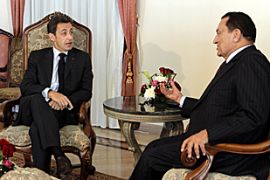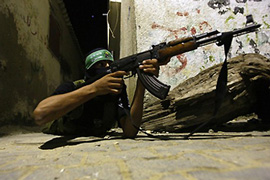Israel rejects truce proposal
EU ceasefire proposal spurned as US blames Hamas for fighting and humanitarian situation.

But on Monday he made his first comments since the Israeli ground offensive began on Saturday, placing the blame squarely, and solely, on Hamas.
“The situation now taking place in Gaza was caused by Hamas. Instead of caring for the people of Gaza, Hamas decided to use Gaza to launch rockets to kill innocent Israelis and Israel has obviously decided to protect herself and her people,” he said.
EU push
| IN DEPTH |
 Latest news and analysis from Gaza and Israel |
 Al Jazeera Labs: Report on and track the war |
 Send us your views and eyewitness videos |
 Watch our coverage of the war on Gaza |
In Jerusalem following talks with Tzipi Livni, Israel’s foreign minister, Karel Schwarzenberg, her Czech counterpart and head of the EU delegation, on Monday said “a ceasefire should be applied as soon as possible”.
Livni reiterated her country’s position that it was Hamas and not the Palestinian people that were the targets and said: “This is a war against terror… we have nothing against the Palestinians.”
Israel’s assault on Gaza has killed at least 548 Palestinians and injured more than 2,450.
Four Israelis have been killed by Palestinian rocket attacks since the start of Israel’s 10-day-old military offensive. An Israeli soldier has also been killed in combat.
The EU delegation, which includes Javier Solana, the EU foreign policy chief, and the foreign ministers of France and Sweden, pledged an additional $4.2m of emergency aid for Gaza and called on Israel to respect international law.
The EU said in a statement that food, emergency shelter items and medical supplies were urgently needed by Palestinians in Gaza and that the aid would be “deployed as rapidly as possible”.
Schwarzenberg, whose country currently holds the presidency of the EU, said: “We presented the Israeli foreign minister with the view of the European Union that a ceasefire should be established as soon as possible as… that [Hamas] rockets have to stop.”
“We are not sharing the view that a ceasefire is only possible if all … aims of the Israeli actions are achieved. We do think that the ceasefire should be as early as possible.”
Monitors rejected
Livni said she saw no reason for an observation and monitoring force, one of several proposals made by the delegation.
“I don’t see how this can help,” she said.
Israel wants any international mission on the Gaza Strip’s border with Egypt to be focused on preventing Hamas from re-establishing a network of underground tunnels that could be used to smuggle in long-range rockets and other weapons, Israeli officials involved in the deliberations said.
Turkey is also working for a ceasefire deal involving international observers.
Following talks on Monday with Walid Muallem, his Syrian counterpart, Ali Babacan, Turkey’s foreign minister, said there were various proposals on how the ceasefire could be secured.
Speaking in Ankara, Turkey’s capital, Babacan said: “Any settlement should be guaranteed by the international community… We believe that only an international observer group can make the settlement applicable and sustainable.”
Sarkozy mission
Nicolas Sarkozy, France’s president, held talks with Hosni Mubarak, Egypt’s president, in Sharm El-Sheikh on Monday, to push for the European-backed ceasefire.
While blaming Hamas for provoking Israeli military action by firing rockets into southern Israel, Sarkozy also condemned Israel’s deployment of ground troops into the territory.
In addition to visiting Cairo, Sarkozy will make trips to Ramallah, Jerusalem, Damascus and Beirut.
The UN Security Council is set to meet again on Monday to discuss the crisis following an emergency session on Sunday that failed to produce a resolution or even a statement calling for a halt to the fighting.
Mahmoud Abbas, the Palestinian president, is also set to hold talks with Sarkozy, the EU delegation, Tony Blair, the Middle East envoy for the Quartet comprising the UN, the EU, Russia and the United States, to discuss the Israeli offensive.
On Monday, Abbas renewed his call for a Gaza truce when he met Alexandre Saltanov, Russia’s deputy foreign minister, in the West Bank city of Ramallah.
“The top priority at this stage is the complete and unconditional stop of the attacks on the Gaza Strip,” Abbas told the Russian official, according to Saeb Erakat, a Palestinian negotiator.
On Sunday, Russia expressed deep concern over Israel’s ground offensive and announced it was sending Saltanov to contribute to a diplomatic push for a ceasefire.
Ali Larijani, the Iranian parliament’s speaker, is heading to Damascus, the Syrian capital, for talks on the crisis where he is expected to meet Bashar al-Assad, the country’s president, and Khalid Meshaal, the political leader of Hamas.
Hamas talks
 |
| Hamas said it would send a delegation to Egypt for ceasefire negotiations [AFP] |
Hamas, which governs the Gaza Strip, said on Monday that it would send a delegation to Egypt for ceasefire negotiations.
Ayman Taha, a Hamas official, told the Reuters news agency that a group would head to Cairo “answering an Egyptian invitation to hold discussions”.
Taha did not say whether the delegation would include Hamas members from Gaza or exiled leaders.
Osama Hamdan, the Hamas representative in Lebanon, told Al Jazeera that the core issue to be discussed in Cairo will be “ending the aggression and lifting the blockade imposed on Gaza for three years now”.